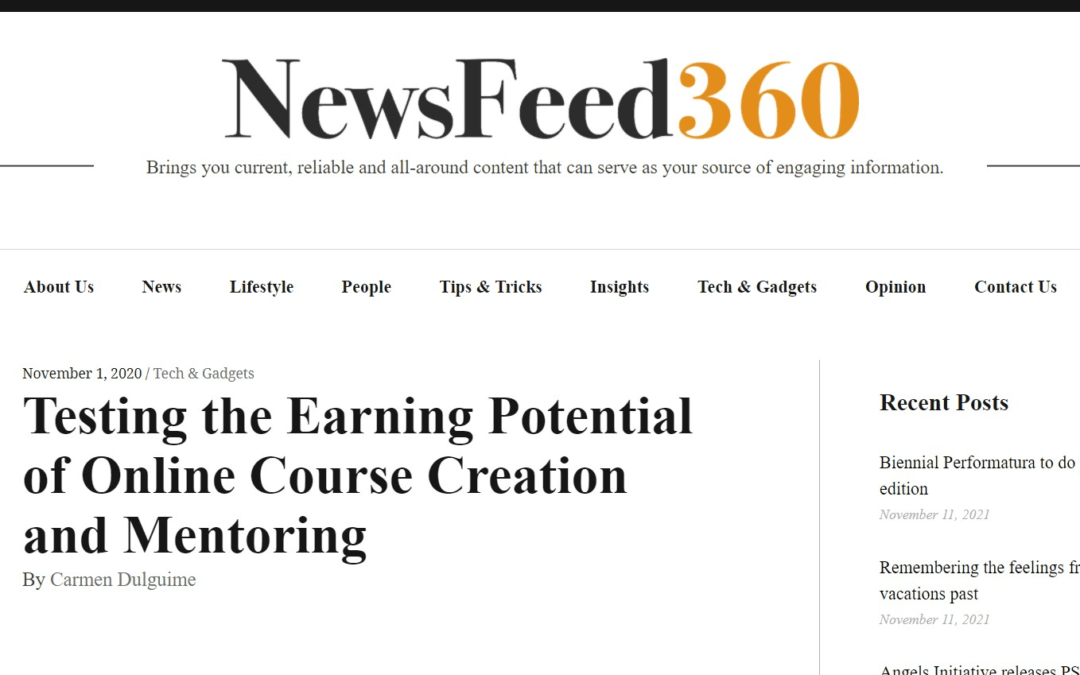If you’re looking for a means to earn income these pandemic days, try testing more than half the population of the world (almost 4 billion) – that’s how big your potential market is if you create at least one online course today. And that’s just people who are currently using social media, according to the Digital 2020 July Global Statshot report of We Are Social and Hootsuite. That’s almost the same number of Internet users around the world today, which stands at 4.57 billion, and growing.

The potential to earn through online course creation does seem prodigious if we consider these stats, but let’s not get ahead of ourselves and start counting the idiomatic chickens. We asked two of the Philippines’ pioneers and leaders in online education about course creation and mentoring in the country just to give us a general overview. We also asked them how Pinoys can earn from online course creation and mentoring to cushion the financial effects of this pandemic and onward to an unraveling normal.
Janette Toral has been advocating online teaching when the Internet was still growing legs. In 2003, she was already giving online learning modules via email to early adopters. Six years later in 2009, she was already getting paid for 2-hour webinars that cost only P500 per attendee. Today, Janette has almost 100 online courses priced varyingly.

Multi-awarded entrepreneur Rossana Llenado started AHEAD in the mid-90s as the Philippines’ first college entrance exam review center for UP, Ateneo and De La Salle. It has since grown into six brands, including AHEAD Online, which provides tutorial services via live video conferencing to an international market.

Learning, carpe diem style
In the film Dead Poets’ Society, Professor John Keating (played by the late Robin Williams) used unorthodox methods of teaching his students according to his Latin idiom, carpe diem (seize the day). It was his way of encouraging them to grab opportunities of the moment and not worry about the future.
The beauty of online courses is that each one is niche, timely and may be unacademic. The students can take the lessons at their own pace, time and place. This is why online courses appeal more to professionals and entrepreneurs whose time are already occupied by their present occupation, but would still like to learn more to upgrade their skills and widen their knowledge even further.
The lessons in online courses can be more interactive with plenty of practical exercises according to real-life present situations that may yield actual beneficial results. So if it’s a course on vlogging, for example, the student may be able to raise the number of subscribers, likes and comments according to his performance during exercises.
Among Philippine universities, at least one offers a similar setup for students. Mapua University has started to offer a fully online formal bachelor’s degrees in IT and engineering, making the program available for students and professionals here and abroad. While online courses provide certificates upon completion, the University gives diplomas.
Zero to minimal capital for unlimited returns
Unlike typical startup businesses, online course creation does not require capital unless you’re the type who always want to go big at the onset. An artist who wants to teach digital animation, for example, might want to invest on high-tech equipment to produce dynamic visual demos and videos as part of his course offer.
Of course, a good bandwidth and a reliable platform like WordPress, GetResponse, Basecamp and the like as host for your course should be important considerations. You may also choose to subscribe to video hosts like Vimeo for your visual materials that you can embed in your courses. Those who don’t require website hosting for their course offer can actually just use Facebook Groups to post their invitation to a course, and later conduct the actual course via FB Live.
A true educator, Rossana also points out the importance of a learning management system, production knowhow, payment system and marketing platform. She says that the entire process from topic to handing over certifications can vary, depending on the difficulty of the topic. “It can be as short as one day, to as long as a month,” she shared. Janette shares this simple tip: start with an outline or a topic, post it on social media, and see if anyone among your contacts is interested to enroll, before fully taking off.
Creating and teaching online courses can be lucrative, depending on how you price each course. Relevance, level of interest, uniqueness, extent of the course, and audience can be determinants for pricing. Today, you can pay for an online course for as low as Php299 (promo price) to as much as five figures for a lifetime access. Of course, as a course creator, you have to be responsible enough to update your courses whenever necessary. Talk about passive income!
“Start with an outline or a topic, post it on social media, and see if anyone among your contacts is interested to enroll, before fully taking off.”
The online course mentoring industry in the Philippines is a hatchling
There is still no clear data as to the extent of the online course creation and teaching in the Philippines, but we can get an idea of Filipino behavior online according to the Digital 2020: Global Digital Yearbook. It says that Internet users in the Philippines have a 67% penetration as of 3rd quarter of 2019, spending an average of 9 hours and 45 minutes online. A healthy 76% of them bought something online using any device (mobile phone, laptop, desktop, or tablet). It is not clear what they actually bought online, but with the pandemic giving birth to webinar after webinar online, we can assume that
Filipinos will become more open to buying and taking courses online as the idea of staying home slowly grows on us.
In Facebook alone, there is never a day without free and paid courses of diverse topics – from financial literacy to learning how to speak Korean. And with Facebook still our top social media choice, expect the competition for course creation to get more creative.
Janette’s first email courses in 2003, for example, was composed of 16 chapters that she sent to participants across 35 emails. This included a welcome note, lessons, assignments, assessment, certificate and thank you note. She experimented with different price points, varying the cost of the course from US$6 to US$10, depending on additional requests from 50 paying students who are composed of freelancers and professionals. It was at that time when she launched her course on social media and blogging, which can still be accessed for free until today.
“People are shifting careers, finding time to upskill and are now more exposed to digitalization. They’re bound to notice the courses being offered online”
The main takeaway here is this: the industry is still wide open in the Philippines, and the opportunity to earn is global in scale. If you have special skills or mastery of a specific subject that you think you can share as a course online, the time to explore possibilities is now. There is rich content out there about how to start and run online courses. Do your own research and watch your new digital life blossom into something productive and meaningful.
“People are shifting careers, finding time to upskill and are now more exposed to digitalization. They’re bound to notice the courses being offered online,” Rossana concluded.

